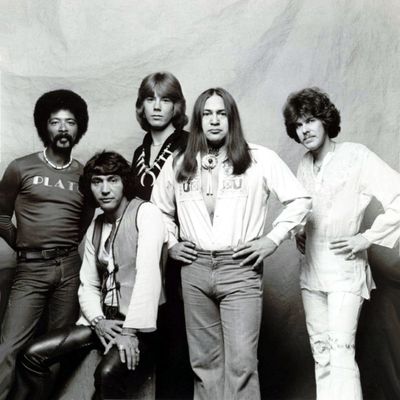
If you saw Guardians of the Galaxy last weekend — and from the looks of it, that appears to be most of you — you likely found yourself grooving along with Chris Pratt’s Peter Quill to the song he plays during one of the film’s opening scenes while simultaneously wondering, Who sings this again? Thanks to Star-Lord and his Awesome Mixtape No. 1, we now know more than we ever could have imagined about the track “Come and Get Your Love” and the band that brought it into the world.
Like Wild Cherry and the Weather Girls, Redbone has for years been one of those groups that tends to pop up at music trivia nights and on listicles about one-hit wonders. But let’s give it up for Redbone, shall we? The band was formed in 1969 by Pat and Lolly Vegas, two brothers of Mexican and Native American descent. The siblings’ original surname, Vasquez, was later changed to Vegas, a suggestion that allegedly came from legendary musician Robert “Bumps” Blackwell, who thought it might be more palatable to white audiences. By the early 1960s, the newly christened Vegas brothers were regulars on the Los Angeles rock circuit and recording run-of-the-mill instrumental surf-rock tracks like “Wax ’Em Down” and “Gypsy Surfer.” They also appeared on the music variety show Shindig!, performing a rousing rendition of “La Bamba”:
Three years after releasing the 1966 album Pat and Lolly Vegas at the Haunted House, the brothers rebranded the act as Redbone. As Pat and current member Raven Hernandez explained in this undated interview, the term was a reference to the Vegas brothers’ heritage. “Redbone means half-breed,” said Pat. “Anyone who has part-Indian blood, that’s a redbone. Back in the old days, if you called a Native American a half-breed, it was fighting words.”
According to Footsteps in the Dark: The Hidden Histories of Popular Music, the group began wearing colorful Native American attire onstage after drummer Peter DePoe, himself Indian, told the band their music had a Native American feel to it. (DePoe would later join the group, as would guitarist and singer Tony Bellamy.) At the time, the brothers ironically had no idea that they, too, had Indian in their blood; it’s a fact they learned later from their grandmother after informing her of their new stage act. Either way, the duo fully embraced their newfound culture. Just check out this live performance of “Come and Get Your Love” on The Midnight Special, complete with beaded headband and a Native American-themed dance number:*
The group’s first album, Redbone, hit shelves in 1970 and included “Niki Hoeky,” a song that would ultimately be covered by Aretha Franklin and, more famously, by P.J. Proby. By 1971, Redbone had a couple of semi-hits on their hands: “Maggie,” which peaked at No. 45 on the Billboard Hot 100 charts, and “The Witch Queen of New Orleans,” which made it to No. 21. Both tracks lack the same smooth come-ons of their most popular song, but they aren’t exactly slogs to get through either, as they trade the chug-a-lug groove of “Come and Get Your Love” for a catchy Cajun rock vibe.
Redbone’s big moment arrived in 1973, when the band released “Come and Get Your Love” and their fifth studio album, Wovoka. By 1974, the song was a smash, spending 24 weeks in the Top 40 and gaining RIAA gold-record status. It even made an appearance on Soul Train, the ultimate arbiter of ’70s cool:
Interestingly, the version Peter Quill finds himself dancing to in Guardians almost didn’t happen on account of its original runtime, which was nearly seven-and-a-half minutes long. “The radio station wouldn’t play it,” says Pat in this low-budget documentary about the band. “So I went into the studio at 3:00 in the morning, didn’t get out until 1:00 the next day, and it went from seven-and-a-half minutes to two, and then it was a hit.”
Two other fun, noteworthy facts about “Come and Get Your Love”: The melody made its way into a 1994 reggae remix of Cyndi Lauper’s “Girls Just Want to Have Fun” called “(Hey Now) Girls Just Want to Have Fun,” which Lolly has a writing credit on. It also showed up on the soundtracks for To Wong Foo, Grown Ups, and the 1999 comedy Dick.
Redbone would eventually release several more studio albums and one-off songs, including the somewhat controversial “We Were All Wounded at Wounded Knee,” about the 1890 Native American massacre. But they would never again reach the acclaim and mainstream popularity they captured with “Come and Get Your Love.”
Today, the group continues to perform as Redbone — though with a mostly new lineup. While Pat is still leading the way (in addition to his Redbone and solo duties, he is also a part-time radio DJ), his brother Lolly died in 2010 due to complications from lung cancer, as did Bellamy, in 2009, from liver failure. DePoe quit the band in 1972 and was replaced by Arturo Perez and then Butch Rillera.
Honestly, it’s too bad Peter Quill wasn’t around during Redbone’s heyday; he probably would have fit right in with the group’s philosophy. While researching this story I came across a terrific quote from Pat Vegas, attempting to describe the band’s sound. “The music has balls and Scotch,” he said, adding, “It’s just a fusion of all those energies and it just gets us off. You’ve got to let yourself be open to it, you’ve got to let yourself be carried by it, in order to reach that energy level where you feel it, not only hear it and feel like dancing to it, but you feel it physically.”
Whether this is an apt description of Redbone’s music is debatable. But it certainly applies to Star-Lord’s dance moves.
* This article previously referred to a beaded headband as a headdress. We regret the error.




